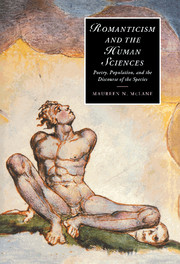Book contents
- Frontmatter
- Contents
- Acknowledgments
- Introduction, or the thing at hand
- Chapter 1 Toward an anthropologic: poetry, literature, and the discourse of the species
- Chapter 2 Do rustics think?: Wordsworth, Coleridge, and the problem of a “human diction”
- Chapter 3 Literate species: populations, “humanities,” and the specific failure of literature in Frankenstein
- Chapter 4 The “arithmetic of futurity”: poetry, population, and the structure of the future
- Chapter 5 Dead poets and other romantic populations: immortality and its discontents
- Epilogue: Immortality interminable: the use of poetry for life
- Notes
- Bibliography
- Index
- CAMBRIDGE STUDIES IN ROMANTICISM
Epilogue: Immortality interminable: the use of poetry for life
Published online by Cambridge University Press: 22 September 2009
- Frontmatter
- Contents
- Acknowledgments
- Introduction, or the thing at hand
- Chapter 1 Toward an anthropologic: poetry, literature, and the discourse of the species
- Chapter 2 Do rustics think?: Wordsworth, Coleridge, and the problem of a “human diction”
- Chapter 3 Literate species: populations, “humanities,” and the specific failure of literature in Frankenstein
- Chapter 4 The “arithmetic of futurity”: poetry, population, and the structure of the future
- Chapter 5 Dead poets and other romantic populations: immortality and its discontents
- Epilogue: Immortality interminable: the use of poetry for life
- Notes
- Bibliography
- Index
- CAMBRIDGE STUDIES IN ROMANTICISM
Summary
One way to re-state the inquiry of the preceding chapter would be to ask, what do dead poets have to do with immortality? Or, to frame the question discursively, what did poetry and moral philosophy have to do with immortality in this period? To address each of these questions, I will turn yet again, this time the last, to the moral-philosophical text I have so often invoked in this project, Malthus's 1798 Essay. For it is in Malthus's Essay that we may discover a surprising case of the use and abuse of poetry for immortality.
A reader of Malthus's 1798 Essay on Population may not be surprised to find included in the essay such data as Dr. Price's tables of births, burials, and marriages. These tables, with their formidable columns and shining official numbers, tend to reinforce the mathematical – that is, the tropologically “real” – foundation of Malthus's thinking. Yet in several quotations Malthus shows himelf fluent in another kind of discourse than the demographic, the arithmetic, or the moral-philosophical. At two critical junctures of his argument, Malthus seals his conclusions with poetic allusions. And these allusions are not to any contemporary poet but rather to Alexander Pope. Within the text of population, then, we find the trace of poetry; this mobilization of poetry is, unsurprisingly, in the service of Malthusian ideology. Moreover, these citations of poetry serve to clinch Malthus's arguments against the conjectures of Godwin and Condorcet.
- Type
- Chapter
- Information
- Romanticism and the Human SciencesPoetry, Population, and the Discourse of the Species, pp. 216 - 226Publisher: Cambridge University PressPrint publication year: 2000

